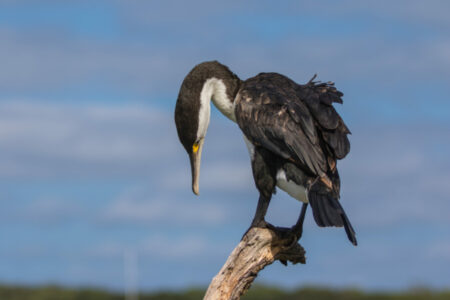
East Auckland resident Corina Hooper has seen first-hand the devastating impact that fishing has had on the pied shag population within the Tamaki Estuary.
Pied shags are a protected species that are large and predominantly white and black and primarily inhabit inshore coastal waters and estuaries.
For 12 years, Hooper has been feeding and looking after the pied shags at the Panmure Basin since NZ Bird Rescue Charitable Trust founder Pam Howlett passed away, and has been warning of the grim fate of the birds for years.
In 2017, she told media that the pied shag colony could be wiped out due to over-fishing.
She called for a fishing ban in the basin to save the population. She has since started a fishing ban petition that currently has 358 signatures.
Auckland councillor Josephine Bartley, who has been working closely with Hooper, advocated for a full fishing ban for the basin at the Auckland Council environment and climate change meeting on July 7 after a notice of motion was passed.
She said limited food sources and fishhooks being caught in shags’ necks was leading to a decline in their numbers.
Hooper says that many birds are dying due to thinking the lure are fish and swallowing them, causing a blockage.
“It’s a very painful way to die,” Hooper says. “If the baited hook, or lure with hooks, goes down past the crop, it rips the innards and bowels. The best thing to do, at that point, is to euthanise them.”
This year five birds have been lost to hooks, Hooper says. Pied shags also become tangled in fishing lines, causing them to hang from trees for days until they die.
“This is why we need a full fishing ban, including drag nets.”
Fishing has also impacted the birds’ food source, Hooper says, along with pollution and properly development. The birds grow hungry, making it more likely to mistakenly seek food from lures and bait hooks.
In a March 2019 report prepared for the Maungakiekie-Tāmaki and Ōrākei Local Boards by local bird expert Shaun Lee, it was noted that the Panmure Basin pied shag colony had 300 adults in 1997.
Hooper reported a population of only 10 adults in 2017.
In 1997, the colony had 150 breeding pairs. It dropped to five breeding pairs in 2017.
While these statistics show a steep decline over the 21st Century, recent numbers have shown that the population has remained steady over the last decade.
In 2012, 24 adult birds and 12 nests were counted.
In May of this year, there were 17 adult shags and 25 nests counted – a similar count to one conducted at the same time in 2021 with 20 adults and 13 active nests spotted.
Despite the steady numbers, a full fishing ban would help the population grow, protect their food sources and prevent unnecessary deaths, Hooper says, including helping other species such as red-billed gulls as they often go after bait fish, which are toxic to birds.
“We’re running out of time,” Hooper says. “We need to protect birds to get them to breeding age.”
Bartley told the Times she will contact government agencies and iwi through her advisers to start the ball rolling.









